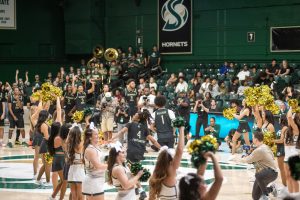Student radio makes waves for CSUS tenant
October 6, 2004
Everyone has a limit, and Rafael Chavez has reached his.
Chavez, station manager of KSSU 1580, Sacramento State’s student-operated radio station, is on a mission to boycott campus resident Capital Public Radio. As of Sept. 17, Chavez has been hanging fliers and issuing press releases around campus calling students to rally together and show their support. This direct confrontation with CPR comes as a result of Chavez’ belief that students on campus are flat-out being ignored.
“All I want is for students to be informed,” Chavez said. “I want them to be informed that Capital Public Radio is on campus, but that they are not here out of the interest of the students.”
After serving as the only student representative on the board of CPR from 2002 to 2004, Chavez believes CPR’s interests are purely financial. He feels that their primary concern is appeasing the businesses and community members sponsoring CPR programming.
From this boycott, Chavez is pursuing the answer to one very specific question. He believes CPR and Sac State’s administration are choosing not to help KSSU students with their now 13-year pursuit to grow in size and respectability within the college and community, since the station was established in 1992.
Essentially, his proposal to CPR is to allow KSSU students to broadcast their programming on one of CPR’s six broadcast licenses that they currently own and operate throughout the central valley.
“It’s unrealistic to turn over any portion of our station to students entirely,” CPR President Mike Lazaar said when asked about the boycott. “However, we do offer a number of internships and part-time positions for students to take advantage of.”
CPR has recently opened up more opportunities for students in their facilities in hopes of increasing student involvement and education. Such opportunities include internships in the fields of talk shows, news, operations, jazz, underwriting, member services and accounting. Lazaar further stated that all of CPR’s part-time positions are open to all members of the community, including students.
“I don’t understand where (Chavez) is coming from with this,” Lazaar said. “He was a board member for two years, and I would have thought that was a more opportune time to bring everything up and talk about it. I haven’t talked to Rafael in almost six months, but would be open to talk if he would want to.”
One person in partial agreement with Lazaar is Barbara O’Connor from the communication studies department. When looking at the situation from the perspective of CPR, she understands that college radio is often stereotyped as guerrilla or rebel radio. And as a public radio station, but also a business, she understands why CPR does not want to take a chance on this type of potentially controversial radio on the airwaves.
O’Connor also believes that CPR should and can do more for the students in terms of providing them with educational opportunities. She feels that the internships they offer are only a beginning. Furthermore, with so many internship opportunities currently available for students, she feels that CPR needs to stay competitive and offer greater benefits such as a higher involvement in designated programming and even paying the interns.
“No, it will not make a difference,” O’Connor said. “Students are not listeners of Capital Public Radio, and that’s a fact.”
According to the CPR Web site, 65 percent of its listeners of KXPR, the CPR station covering Sacramento, have a college degree or beyond, 33 percent have household income of more than $75,000, 28 percent are a professional/technical and 12 percent are a Partner/Corporate officer. These statistics basically translate to an audience that is more mature in age, their career and personal finances.
O’Conner also believes that the goal here is to have on-going and continuing communication if Chavez and CPR want to collaborate on a solution.
“Boycotting ends communication,” O’Conner said. “You want conversations, rather than boycotting. There are other campus radio stations across the country that involves the faculty, students and public radio working together. Perhaps other college radio models need to be examined or even adapted.”
According to their Web sites, such colleges would include the University of Wisconsin, Madison and California State University, Northridge. In addition, colleges, such as Chico State have even found ways to be heard live and uncensored over the Internet.
“(CPR) has ignored us as much as possible,” said Joe Foft, an on-air disc jockey and personality for KSSU.
“The radio industry, as a whole, whether you are in public radio or commercial, is becoming too corporate,” said Foft, who also currently works for four of Clear Channel’s radio stations. “It’s becoming increasingly difficult for people who want to break in, especially as DJs. That’s why (students) need all the help they can get.”
Chavez believes that as an auxiliary member of Sac State, which states its purpose is to function in a supporting role to the university, CPR is ignoring the students. He sees students as being neglected of excellent opportunities that could not only increase their education, but more importantly, increase the involvement of the school and the local community as well.
At its present state, KSSU is operated on only three watts of power. To put this number in perspective, the FCC allocates all stations to run on a minimum of 10 watts, the total coverage area of the station is basically campus, and that rusty old automatic can-opener in the kitchen uses a greater five watts to open an aluminum can.
“Three watts is joke,” Chavez said. “We get no response from the public, no feedback because they can’t even hear us.”






















































































































